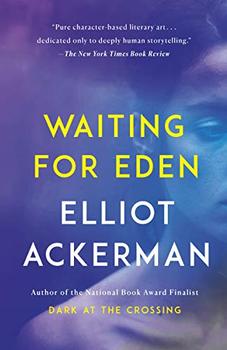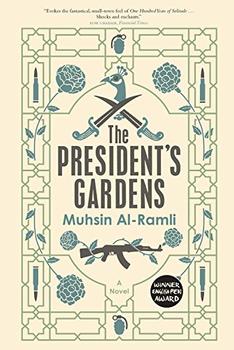Summary | Excerpt | Reading Guide | Reviews | Beyond the book | Read-Alikes | Genres & Themes | Author Bio

In recent years, we have all heard talk—perhaps too much talk—of the Great American Novel. With an exuberance to match the country's great size and influence, American authors and readers have been chasing the elusive beast for centuries. But perhaps in the coffee shops and libraries of Iran, a whole society of book-lovers is doing the same thing, whispering in expectant tones about its own national literary monoliths. Where, they might ask, is the Great Persian Novel? They may have found it in the form of Shahriar Mandanipour's Moon Brow, a big, vibrant, boisterous tale of love and madness set during the Islamic Revolution and its aftermath. It is a story for the ages, and its hero, the ill-fated and deeply neurotic Amir Yamini, who loses his heart to a mysterious woman (the Moon Brow of the title) and his arm in the Iran-Iraq War, might just take his place at the top table of Iranian fiction.
Filtered almost exclusively through Amir's muddled consciousness, Moon Brow is intimate in its inquiries and epic in its scope, ushering the reader through some of the most turbulent decades in Iranian history, and from locations as diverse as the polluted heat-haze of modern Tehran to the burning battlefields of the Iran-Iraq War, to the near-mystical calm and beauty of the Caspian Sea. But for all its dramatic events and landscapes, Moon Brow is really the tale of one man. That man is Amir, and he is a truly original creation, with his regal heritage, his missing left arm, his demented reveries, his Quixotic adventures (in a central plot device, he actually goes in search of the aforementioned limb).
So strange a creature is Amir that in order to serve his frantic mind, Mandanipour eschews the formalities of first- or third-person narration in favor of a more unique approach. Most of the novel is "written" by a pair of scribes, each occupying one of the hero's shoulders, rather like figures from illustrations representing good and evil. Together they lead him through the corridors of the past, leaping from soothing childhood memories to hideous recollections of war. The resulting narrative is marked by a clear sense of fragmentation and dislocation, punctuated by shocking juxtapositions, so that Amir's life resembles the aftermath of one of Saddam's missile attacks, with the mundane and the nightmarish grimly coexisting.
Similarly, both of Amir's "scribes" have their own styles and preoccupations, but neither is obviously more benign than the other. This is possibly an allusion to the Iran-Iraq War itself (see 'Beyond the Book'), which forms the terrible heart of Moon Brow; in a conflict initiated by one power-hungry dictator and perpetuated by another, the voice of morality inevitably becomes muffled. It is just such a confused, violent, post-moral world that produces a man like Amir, and a book like Moon Brow.
If all of these jarring shifts in time and place sound a little intimidating, that's only because they are. Moon Brow is a difficult book, at least in the beginning. It jumps from location to location and era to era with an insouciance that sometimes feels reckless. But its difficulty is softened by the author's dry and sometimes diabolical sense of humor. At one point, Amir is sentenced to a flogging by the authorities. The operation itself is described in excruciating detail; the whip is soaked in a poison that smells so foul "even the attendants in the emergency room were too revolted to drain the pus," but then, in an absurd, almost Kafkaesque shift in tone, Amir berates his body "for not being able to make more pus." Here, as elsewhere, the bitter comedy of Mandanipour's prose is rendered into elegant English by Khalili Sara, whose translation is as precise as it is seamless.
Beyond the dark comedy, Moon Brow's unusual form begins to feel increasingly necessary as one picks up on the many elegant symmetries and echoes that occur within its pages. The loss of Amir's arm is beautifully foreshadowed in an early scene in which he takes a love interest, Khazar, to the cinema. For pages, Mandanipour describes the subtle movements of his hero's doomed arm as it fumbles through the darkness towards her shoulder. An awkward, romantic gesture of affection is counterbalanced, much later, by a brutal and random act of war.
The vertiginous political ferments through which Mandanipour lived resemble nothing so much as the Russia inherited by Bulgakov and Nabokov. All three writers lived to see one form of state tyranny collapse and another rise in its place, and all three responded in much the same way: non-linear narratives, clueless and half-demented narrators, a dose of surrealism, and humor of the blackest hue. As with his predecessors, Mandanipour reminds us that true humanity belongs not in the gray corridors of officialdom or on the faces of unsmiling ayatollahs and bureaucrats, but with the common dreamers and drifters whom they purport to represent. Perhaps, when utopian dreams fail—as they do, over and over, in Moon Brow—the only appropriate response, to borrow one of Nabokov's timeless phrases, is laughter in the dark.
![]() This review
first ran in the May 2, 2018
issue of BookBrowse Recommends.
This review
first ran in the May 2, 2018
issue of BookBrowse Recommends.

If you liked Moon Brow, try these:

by Elliot Ackerman
Published 2019
From the National Book Award finalist, a breathtakingly spare and shattering new novel that traces the intersection of three star-crossed lives.

by Muhsin Al-Ramli
Published 2019
One Hundred Years of Solitude meets The Kite Runner in Saddam Hussein's Iraq.
To make a library it takes two volumes and a fire. Two volumes and a fire, and interest. The interest alone will ...
Click Here to find out who said this, as well as discovering other famous literary quotes!
Your guide toexceptional books
BookBrowse seeks out and recommends the best in contemporary fiction and nonfiction—books that not only engage and entertain but also deepen our understanding of ourselves and the world around us.